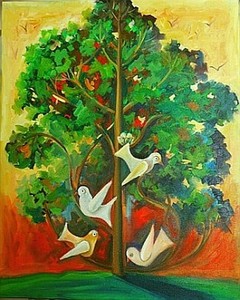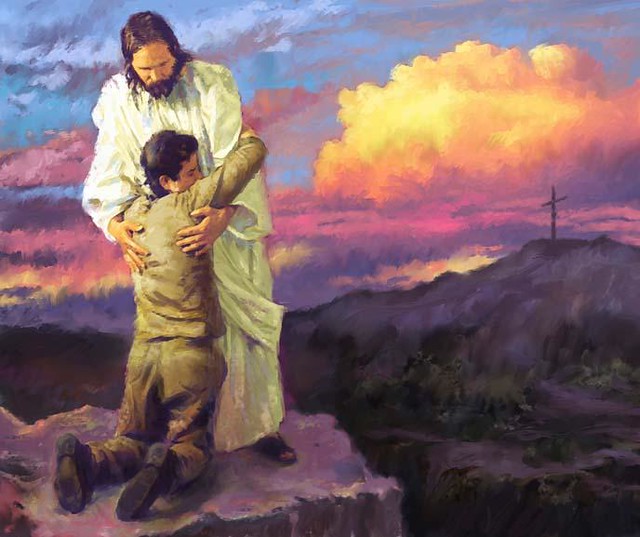
ELEVENTH
SUNDAY IN ORDINARY TIME
Ezk.17: 22-24; Ps.92; 2 Cor.5:6-10; Mk. 4: 26-35
According
to the United Nations World Food Program, 21,000 people die every day because
of hunger or hunger-related causes. This is one person every four seconds. The
Missionaries of Africa also noted that more than one billion people do not have
enough clean water to provide for their needs. Thus, 2,500 children die each
day due to thirst. With these horrifying figures, we are made to ask ourselves,
if Jesus has established the Kingdom of God here on earth, why such a high number
of deaths?
Early
on in Mark 1: 15, Jesus proclaimed that “the time is fulfilled, and the kingdom
of God is close at hand.” Moving forward in our Gospel today, Jesus explained
to the people in parables what the Kingdom of God is like. And so, in this 11th
Sunday in Ordinary time, let us reflect on three characteristics on the Kingdom
of God and how these qualities challenge our lives today.
In our
first reading today which is another parable, we read that the Lord will tear
off a tender shoot from the topmost branches of the cedar. In our Gospel, Jesus
compared the Kingdom of God to a mustard seed which is the smallest of all the
seeds on the earth. These images therefore teach us that the establishment of
the Kingdom of God here on earth started small. When Jesus announced that the
kingdom is at hand, such announcement remained insignificant among the people.
We have
to accept the truth that in life, we cannot stop and end problems with a single
bang. As an example, look at the apostolate of the Missionaries of Charity
founded by Mother Teresa. For quite some time now, they have been trying to
uplift people below the poverty line. However, until today, there are still
many poor people. Yes, we cannot end problems grandiosely. Yet, we are part of
the Kingdom of God. It is a different thing to do a small act and to do nothing
at all. As members of the kingdom, we are also called to start small. And this
is what Mother Teresa taught us. If we want to help the poor, start from your
own backyard. We do not need to begin big because great things start from small
beginnings. What is important then is our small and insignificant decision to
choose that which sets our human hearts free.
In our
first reading, Ezekiel tells us that after tearing off a tender shoot, the Lord
will plant it on a high and lofty mountain. Soon it shall grow, put forth
branches, bear fruit, and becomes a majestic cedar. In our Gospel, the Kingdom
of God is likened to a man who scattered seed on the land. Later on, without
him knowing how, the seed would sprout and grow. It will bear fruit and be ready
for harvest. These imageries tell us
another quality of the Kingdom of God – that it is in progress. Establishing
the kingdom of God here on earth does not happen overnight. It goes through a
process of development.
Our
fight against the injustices in the world and our own share of human suffering
will continue to linger on in our lives. As the saying goes, “if it is not yet
a happy ending, then, it is not yet the ending.” As members of the Kingdom of
God, we have to remind ourselves of this reality – the ongoing struggle for
peace in the world. Along the way, there will be a lot of challenges. But what
is important is not success but our faithfulness to such “small and
insignificant” decision we once made in our lives.
Finally,
Ezekiel tells us that once it has become a majestic cedar, “birds of every kind
shall dwell beneath it, every winged thing in the shade of its boughs.” In our Gospel, Jesus tells us that the
mustard seed once it becomes the largest of plants, birds of the sky will dwell
on its shade. These tells us the final characteristic of the kingdom of God –
it is meant to be shared for all.
We
cannot put an end to human suffering all by ourselves. As members of the
kingdom of God, we are called to share in the mission of Christ here on earth.
Poverty, hunger, and the other problems in society cannot end if only a minority
works. Everyone must do his part. Family problems cannot be solved if only the
mother or the father is working. Everyone must cooperate. All must work so that
everyone can truly and freely dwell in this world.
Poverty,
hunger, and suffering in this world is only one side of the coin. We must not
forget that Christ has long established God’s kingdom here on earth. And so, we
are filled with hope to continue with our fight against the darkness of evil
and sin. We do not act alone and in greatness for surely it will not last.
Rather, let us begin with our “small and insignificant” choice to do better.
Let us persevere along the journey and never forget that we have a companion.
In the end, we can truly re-echo the words of St. Paul in our second reading
today who said, "for we walk by faith, not by sight. We are courageous, and we would rther leave
the body and go home to the Lord.” Amen.



.jpg)

